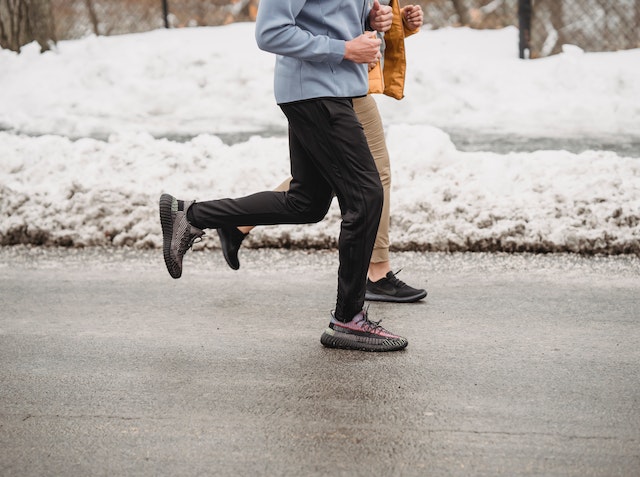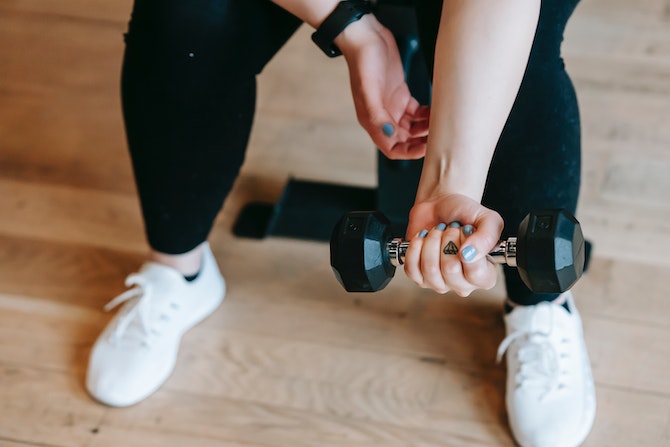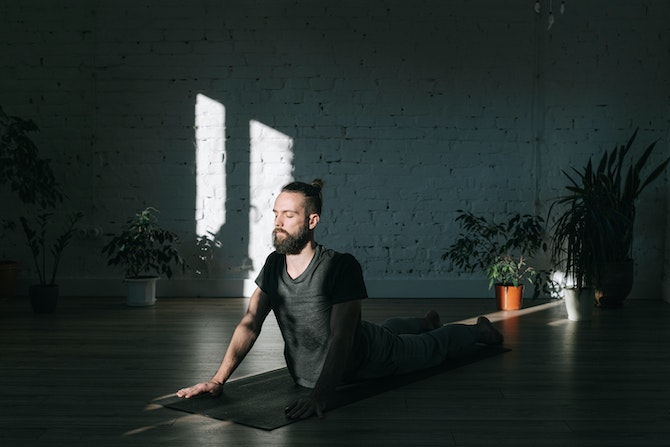
How Does Exercise Improve Sleep?
January, United Kingdom. Across the nation, people are donning gym shorts, digging out weights, and notching up miles on the treadmill.
And that’s fantastic. Truly, whether you’re a seasoned yoga veteran or a wide-eyed weight room newbie, there are few activities more beneficial than exercise.
But you don’t need us to tell you that regular exercise makes you fitter, healthier and happier. You already know that. But what you may not know is the positive impact squeezing in your daily steps has on your sleep.
That’s right, from power walks to push-ups, squats to skipping, regular exercise promotes restful sleep. (And gives you a warm fuzzy sense of accomplishment.)
So, to start the year on the front foot (literally), we’ve investigated the snooze-tastic benefits of getting your sweat on as we seek to answer the question:
How does exercise improve sleep?

How Exercise Helps Sleep
It’s the truest of truths, right? The more you exercise, the better you sleep. And while that’s (mostly) accurate, the relationship between exercise and sleep is far more complex that it may seem.
For example, you shouldn’t expect immediate results. Like anything worth doing, exercising for better sleep takes time to offer up its full benefits. You have to put in the work.
In fact, a 2013 study tested groups of both workout regulars and workout resisters and discovered that even after two months, sleep hadn’t improved.
Until it did.
When those same people were tested again just four-weeks later, results showed that they were enjoying up to 1.25 hours more sleep per night. Not to mention a notable improvement in the quality of sleep snagged by those tested.
Truly, the impact of exercise on sleep is more slow burn than quick hit. But once you’ve started the work, the benefits keep piling up.
For example, regular exercise can help to regulate your circadian rhythm (your built-in body clock) helping your brain understand when it’s time to wind down.
You see, our brains love routine. So, if you exercise at the (roughly) the same time each day, your brain will intuitively build its sleep/wake cycle around this pattern, meaning you’ll sleep seamlessly into a sleep rhythm, further improving your quality of sleep.
And that’s not all. Oh, no. In fact, committing to a consistent exercise routine can even lower the risk of diabetes - a known sleep disruptor.
But the benefits aren’t exclusively physical. Exercise has been proven to alleviate symptoms of anxiety and depression; both of which can hugely interfere with your sleep.
Exercise as a Sleep Disruptor
Minor tangent here, but we’d be remiss if we didn’t address it.
While exercise does improve overall sleep quality and duration, there is a catch, and it has to do with when you squeeze in your sit ups. Exercise increases your core body temperate and boosts the amount of adrenaline in your body. Which is good. That’s what you’re aiming for.
However, if these spikes occur too close to bedtime, there’s a strong chance that your workout will have the opposite of the desired effect, pumping your body up when you’re trying to wind it down, making it difficult to sleep.
The trick? Well-timed workouts. Ideally, no closer than three hours to bedtime.
This will allow your body to enjoy the endorphin-y rush of a workout, reap the sleep benefits and still have time to relax before bed.
Which is the Best Exercise for Sleep?
So, we’ve established that exercise and sleep are innately linked. We’ve noted that it’s important to consider the timing of your workout. We’ve even touched upon the underlying science.
In fact, the only thing we haven’t done is offer some practical insights on the best exercise for sleep - as in, the literal sweaty, grunt-y good stuff that gets the endorphins flowing and promotes restful sleep.
Of course, any exercise you do will help. You don’t have to train like you’re auditioning for Ninja Warrior, but it’s worth noting that different types of exercise yield different benefits, so it’s useful to understand the effect they have on your mind and body – both influence your quality of sleep.
Aerobics
Aerobic exercise (cardiovascular exercise, if you’re fancy) focuses on getting your heart pumping. It’s the exercise that the phrase ‘getting your sweat on’ was coined for.
Typically including running, swimming, cycling, skipping, and walking, aerobic exercise floods your bloodstream with oxygen, posing huge health benefits ranging from lower risk of heart diseases to staving off strokes.
And it’s fantastic for sleep.
You see, by getting your heart rate up, you build up so-called ‘sleep debt’, essentially meaning that your body will be demanding sleep to recover from the strenuous activity.
But there’s more to it than that.
A number of studies have revealed that regular aerobic exercise can alleviate symptoms of insomnia and lessen the impact of conditions such as common sleep problems such as sleep apnoea.
So, whether it’s a few lengths of the pool, a vigorous session on the exercise bike, or even just a brisk walk, making time for cardiovascular exercise can massively boost your chances of getting better sleep.

Resistance
Dumbbells. Kettle bells. Powerbands. Barbells, if you’re brave.
Resistance training – often known as ‘weight training’ – broadly refers to any type of exercise that requires you to lift or pull. Hence, resistance. It can also include isometric exercises such as sits-ups, push-ups, and pull-ups.
A favourite of anyone eager to increase their strength, tone their body, or simply challenge themselves with a more intensive workout, resistance training poses benefits for your physical and mental health.
For example, regular weight training strengthens your muscles, improves your posture, and has been proven to lower cholesterol, decrease blood pressure, and prevent weight gain.
Some experts argue that resistance training is superior to aerobics in getting better quality sleep. And while the jury is divided on the matter, there’s an agreement that resistance training promotes sleep.
How? Well, it comes down to post-workout fatigue and your body’s natural recovery process.
By pushing your body with weights, cables, and crunches, you essential mildly tear your muscles, requiring rest to properly repair them. It’s why you feel so… fatigued after lifting weights. It’s why you crave a protein-fix.
Moreover, resistance training promotes the release of a natural chemical known as adenosine, which stimulates sleep inhibiting neural activity and causing drowsiness.

Yoga
Full disclosure: yoga is technically a form of resistance training. But given its specific benefits, we wanted to explore it in more depth.
For the uninitiated, yoga is a type of exercise that combines resistance training, meditation. It’s as much an exercise for your mind as it is for your body, making it a powerful sleep-ally.
Derived from an ancient Hindu practice, yoga is widely considered to be the ideal balance of exercise and mindfulness and is sometimes even prescribed by doctors as a treatment for everything from anxiety to high blood pressure.
Practiced regularly, yoga can improve your flexibility, increase your energy levels, and help you maintain a healthy weight. It can even ease any physical discomfort you may be experiencing.
A 2012 survey found that 55% of people who practices yoga reported improvements to the quality and quantity of their sleep, with upwards of 85% of people noting lower levels of stress – another common sleep disruptor.
Despite its reputation for difficulty, there are many entry-level yoga poses ideal for beginners; the real trick is committing to regular practice. Yoga isn’t a quick fix. But the more you hone your craft, the greater the sleep-rewards will be.

Exercise and sleep are intrinsically linked. And they hugely influence each other. The more you exercise, the better you sleep. The better you sleep, the more likely you are to exercise.
So, whether it’s a notching up some steps, committing to crunches, or simply weaving some gentle yoga into your bedtime routine, the answer to the question ‘does exercise help sleep’ is a resounding yes.
But you won’t be able to answer. Because you’ll be sleep.
For more sleep tips, be sure to check out our sleep blog. It’s bursting with tips for getting you’re a good night’s rest. Want sleep tips delivered directly to your inbox? Sign up for our emails.







Leave a Reply